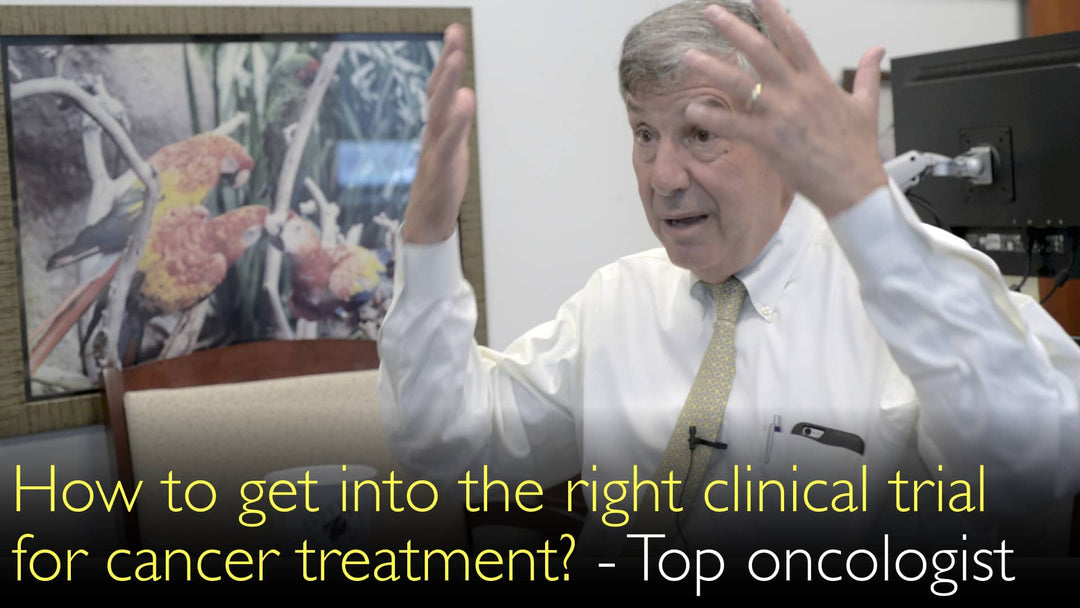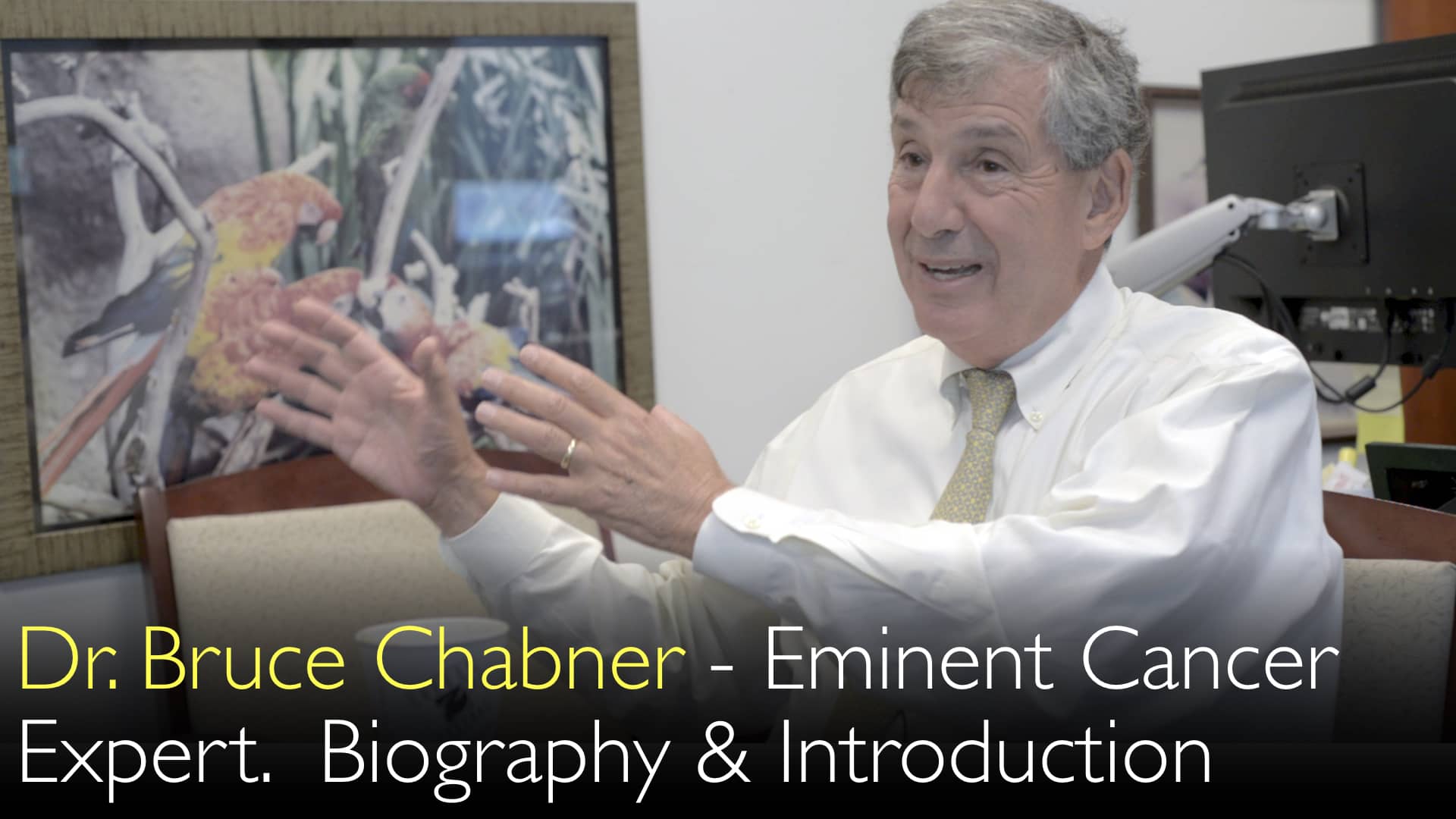Dr. Bruce Chabner, MD, en ledande expert inom onkologi och kliniska prövningar, förklarar hur patienter kan hitta de mest lämpliga cancerstudierna genom att vända sig till stora cancercentra, där hundratals pågående studier erbjuds. Han belyser också de kritiska utmaningarna med rekrytering till kliniska prövningar och datadelning, samt lyfter fram initiativ som Project Data Sphere, som syftar till att göra omfattande dataset offentligt tillgängliga för global forskning för att påskynda utvecklingen av nya cancerläkemedel.
Så hittar du rätt klinisk cancerstudie för behandling
Hoppa till avsnitt
- Att hitta kliniska cancerstudier vid stora centra
- Begränsningar med lokalsjukhus för studier
- Tillgång på kliniska studier efter tumörtyp
- Utmaningar med patientrekrytering i cancerstudier
- Initiativ för delning av kliniska studiedata
- Att värdera patienters bidrag till cancerforskning
- Fullständig transkription
Att hitta kliniska cancerstudier vid stora centra
Den mest effektiva strategin för att hitta en lämplig klinisk cancerstudie är att söka vård vid ett stort akademiskt cancercenter. Som Dr. Bruce Chabner, MD, förklarar är dessa institutioner nav för forskning och driver ofta hundratals studier samtidigt. Han konstaterar: "Vi har mer än 300 pågående kliniska cancerstudier när som helst. Vi har 80 experimentella cancermediciner under test. Så dina chanser att hitta rätt kliniska cancerstudie är goda om du kommer till ett cancersjukhus som detta." Denna koncentration av forskningsverksamhet ökar avsevärt patientens möjligheter att få tillgång till nya terapier.
Begränsningar med lokalsjukhus för studier
I motsats till stora akademiska centra har lokalsjukhus vanligtvis betydligt färre, om några, aktiva kliniska studier öppna för patientrekrytering. Dr. Bruce Chabner, MD, gör en tydlig distinktion och noterar att en patients chanser att hitta en studie är "mycket bättre än om du går till ett lokalsjukhus. Du kanske inte hittar en klinisk cancerstudie där." Detta beror på den betydande infrastruktur, finansiering och specialiserad personal som krävs för att genomföra komplex klinisk forskning, vilket oftare finns vid utsedda omfattande cancercentra.
Tillgång på kliniska studier efter tumörtyp
Tillgången på kliniska studier beror också starkt på patientens specifika cancerdiagnos. Dr. Chabner påpekar att "inte alla tumörer har sådana cancermediciner", vilket innebär att antalet experimentella terapier varierar kraftigt mellan cancertyper. Patienter med vanligare cancerformer, som lungcancer, melanom, tjocktarmscancer eller bröstcancer, har ofta ett bredare utbud av kliniska studier att undersöka. Det är viktigt för patienter och deras onkologer att undersöka vilka studier som finns tillgängliga för deras specifika tumörtyp.
Utmaningar med patientrekrytering i cancerstudier
Ett stort systematiskt problem inom onkologisk forskning är svårigheten att rekrytera tillräckligt många patienter för att framgångsrikt slutföra kliniska studier. Dr. Anton Titov, MD, belyser en förbluffande statistik från diskussionen: "Nästan 60% av de kliniska studierna misslyckas med att hitta tillräckligt många patienter." Vidare är publicering av resultat en separat utmaning, där Dr. Titov noterar att "endast 20% av de kliniska studierna publicerar sina resultat." Detta skapar ett betydande hinder för att dela värdefull data som skulle kunna gynna framtida patienter och främja området.
Initiativ för delning av kliniska studiedata
För att bekämpa utmaningarna med datasegmentering och opublicerade resultat har flera viktiga initiativ lanserats. Dr. Bruce Chabner, MD, beskriver Project Data Sphere, ett arbete detaljerat i New England Journal of Medicine som syftar till att samla de-identifierad data från cirka 100 000 patienters erfarenheter i kliniska studier och göra den offentligt tillgänglig. Målet, som Dr. Bruce Chabner, MD, förklarar, är så att "forskare över hela världen kan gå till sin dator och hämta ut datan" för att utföra nya analyser och påskynda upptäckter.
Att värdera patienters bidrag till cancerforskning
Att erkänna det enorma bidraget från patienter som deltar i klinisk forskning är en nyckeletisk imperativ. Dr. Bruce Chabner, MD, nämner också ett arbete av tidskriften The Oncologist, som han redigerar, för att uppmuntra publicering av data från studier så att deltagande patienter "faktiskt kan se resultaten." Han betonar att patienter som anstränger sig för att delta i en experimentell klinisk cancerstudie förtjänar att veta att deras bidrag har nått allmänheten och är tillgängligt för det vetenskapliga samhället att använda, vilket säkerställer att deras erfarenhet gynnar andra.
Fullständig transkription
Dr. Anton Titov, MD: Tusentals kliniska studier, inklusive nya cancerbehandlingar, rekryterar patienter. Hur hittar man den mest lämpliga kliniska cancerstudien snabbt? En framstående onkolog förklarar. Utmaningen är också hur man hittar rätt kliniska cancerstudie för medicin.
Eftersom kliniska cancerstudier har ett mål. De sponsras ofta av ett läkemedelsföretag. Målet med en kliniska cancerstudie är att uppnå statistisk signifikans för cancerbehandlingen. Detta skapar en intressekonflikt. Det är en utmanande situation.
Så hur hittar man rätt kliniska cancerstudie?
Dr. Bruce Chabner, MD: Svaret är att gå till ett cancercenter. Gå till ett cancercenter som detta här. Vi har mer än 300 pågående kliniska cancerstudier när som helst. Vi har 80 experimentella cancermediciner under test.
Så dina chanser att hitta rätt kliniska cancerstudie är goda om du kommer till ett cancersjukhus som detta. Vi är mycket bättre än om du går till ett lokalsjukhus. Du kanske inte hittar en klinisk cancerstudie där.
Inte alla tumörer har sådana cancermediciner. Du kan ha lungcancer, melanom, tjocktarmscancer eller bröstcancer. Då är det bättre att titta på tillgången på kliniska cancerstudier.
Dr. Anton Titov, MD: Absolut! Det är en mycket viktig punkt. Eftersom du också nämnde i en av canceröversiktsartiklarna att nästan 60% av de kliniska studierna misslyckas med att hitta tillräckligt många patienter. Ja! Endast 20% av de kliniska studierna publicerar sina resultat. Detta är en enorm utmaning för att dela kliniska studiedata.
Dr. Bruce Chabner, MD: Ja! Vi har precis startat ett arbete i "Oncologist"-tidskriften. Jag redigerar denna cancertidskrift. Vi uppmuntrar cancerpatienter att skicka in data. Vi kommer att sätta det i form av en kort publikation. Vi kommer att göra diagrammen. Vi kommer att visa data och göra den tillgänglig för alla.
Så att cancerpatienter som deltar i studier faktiskt kan se resultaten. De vet att de har gett någon nytta. De ansträngde sig för att delta i en experimentell klinisk cancerstudie. Det förtjänar att nå allmänheten. Det förtjänar att finnas där för det vetenskapliga samhällets användning.
Så det är en viktig sak. Vi måste se till att dessa kliniska cancerstudier publiceras.
Dr. Anton Titov, MD: Det är fantastiskt. Det tar bokstavligen decennier att komma till punkten att dela data. Det handlar inte bara om att publicera positiva data eller ändra data. Det är där Beau Biden-initiativet för datadelning kommer in.
Dr. Bruce Chabner, MD: Förhoppningsvis. Vi arbetar med datadelning. Det är ett projekt som heter Project Data Sphere. Vi har precis beskrivit detta cancerprojekt i en artikel i New England Journal of Medicine. Detta försöker samla hundra tusen patienters erfarenheter från kliniska studier. Vi kommer att göra det offentligt tillgängligt.
Så att forskare över hela världen kan gå till sin dator och hämta ut datan. De kan säga: "Om jag hade provat min cancermedicin på denna undergrupp av patienter, hade den kanske fungerat."
Dr. Anton Titov, MD: Datadelning för nya cancermediciner är mycket, mycket viktigt.





